Expert advice on standing desks: Should you try one?
Plus, tips on how to find a standing desk for you.
Sitting at a computer all day can be taxing on our bodies.
But sitting in one general area isn’t necessarily a choice for those with desk jobs. So how can we alleviate the tension in our bodies while still performing our daily duties?
Standing desks are one tool and if you’re a remote worker, there are standing desk options that can fit seamlessly into your at-home office space.
We spoke with experts to learn more about the effects of sitting versus standing as well as the potential benefits and misuse of a standing desk. Standing desks can be one of the tools -- along with proper movement and stretching -- to create a more comfortable working environment.
Our experts
We spoke with Allyn Bove, a physical therapist, researcher and assistant professor from the University of Pittsburgh School of Health and Rehabilitation Sciences (SHRS).
Our second expert is Anne-Kristina Arnold, senior lecturer of ergonomics at Simon Fraser University in British Columbia.
How sitting affects our health
“Sedentary behavior in general (prevalent while working at a desk), has been linked in the literature to many negative health outcomes, including metabolic disorders, obesity, diabetes, some cancers, and longevity,” Arnold tells ABC. She adds that sitting for four to eight hours consecutively is “particularly problematic” as it may not be able to be reversed by exercise.
Beyond that, Arnold points to musculoskeletal discomfort and injury that can be caused by poor posture while sitting.
“Anytime we see a patient coming in with back pain, neck pain or upper extremity pain, one of the first questions we’ll ask is ‘What’s the nature of your job?’” Bove said.
Usually, it’s people who sit for “hours on end” and don’t have the chance to move around as much as they should, she says.
How standing affects our health
Arnold says standing “helps to align the lumbar curve to a neutral position,” which can help address back pain.
But “there are some significant negative effects of standing for long periods,” Arnold says, considering a “long period” to be one to two hours at a time. Muscle fatigue can lead to leaning forward, “placing excessive pressure on the spine or [standing] with more weight on one foot than the other, putting strain on the hip.”
“There is also research to show long periods of standing increases the risk for cardiovascular disease. Standing for long periods of time can be a concern for pregnant women -- doctor’s recommendation is advised.”
Should you try a standing desk?
“A standing desk can definitely help,” Bove says, reiterating that the most important thing is to “transition between different positions at least once an hour.”
“A standing desk that is set up properly allows you to keep your spine in a neutral posture. It also allows for an additional working posture,” Arnold adds. Standing at your workstation may also encourage micro-movements, but still, movement is key.
“There is some research that shows that people who convert fully to standing desks do have some of the same issues,” Bove says. “It’s just more related to the standing than the sitting.”
How to set up your standing desk
“A standing desk should be adjustable, to accommodate a variety of sizes of users, but also so that one individual can adjust the desk to their needs throughout the day to create different postures,” Arnold says, adding that recent research favors electronically adjustable workstations over manual ones.
To set it up, Arnold says to position it in a way that enables your elbows to be between 80 to 100 degrees while typing, adding that a desk with a forward slope helps maintain a neutral neck.
“The desk surface should be deep enough to allow the mouse and keyboard on its surface without a keyboard holder … A desk surface [with] a crescent shape … is a way to make the best use of the space as it conforms to the rotational way our joints move.”
Bove points to free online calculators to determine how to position your standing desk based on your height.
But generally speaking, Bove says, there are two main principles: “You want the monitor to be at or just below your eye level so that you aren’t looking up at that monitor. Secondly, you want it at a height so that you have some forearm support so that when you’re using your keyboard or your mouse, your wrists are able to stay approximately in neutral.”
“Care should be taken to make sure the computer screen is at eye level,” Arnold adds. If not, users will slump forward in order to read the screen. A separate shelf or monitor support on the desk for the screen will help.”
A couple of additional tips: Bove notes you can switch into sneakers while using your standing desk or to add an anti-fatigue mat to help reduce forces “that may be coming up through the backs of your legs and up into your lower back.” You can also set yourself timers to remind you to adjust your positioning.
“Good footwear with arch support is important when using a standing desk,” Arnold adds.
Stretching at your standing desk
Bove says the most common areas that need stretching if you’re at a computer all day are your low back and your forearms.
If you do have an opportunity to get up and move about, Bove says that you could use your standing desk to help with your stretches.
“You can use the edge of your standing desk to stretch your forearm muscles,” Dr. Bove suggests.
“If you put your arms straight out in front of you and then bend your wrist up so you’re looking at the back of your hand … put your fingers against the edge of your desk and lean in. You should feel a stretch in your forearm. You can do the same stretch opposite: If you move your wrist down, so you’re able to see the palm of your hand, and then use the desk to give you a little bit more force to stretch the back of the forearm muscles.”
Bove recommends these stretches for those who tend to struggle with tendonitis or carpal tunnel syndrome.
To focus on the low back, Bove says that you should use the standing or seated desk to lean forward as far as you can and get into the cat-camel position performed in yoga practices. “Stretch out across the desk for 30 seconds or a minute.” And then do the opposite and lean back -- you can use your desk for balance.
By clicking on these shopping links, visitors will leave this website. These e-commerce sites are operated under different terms and privacy policies than ABC. ABC will receive a commission for purchases made through these links. Prices may change from the date of publication.
Shop standing desks
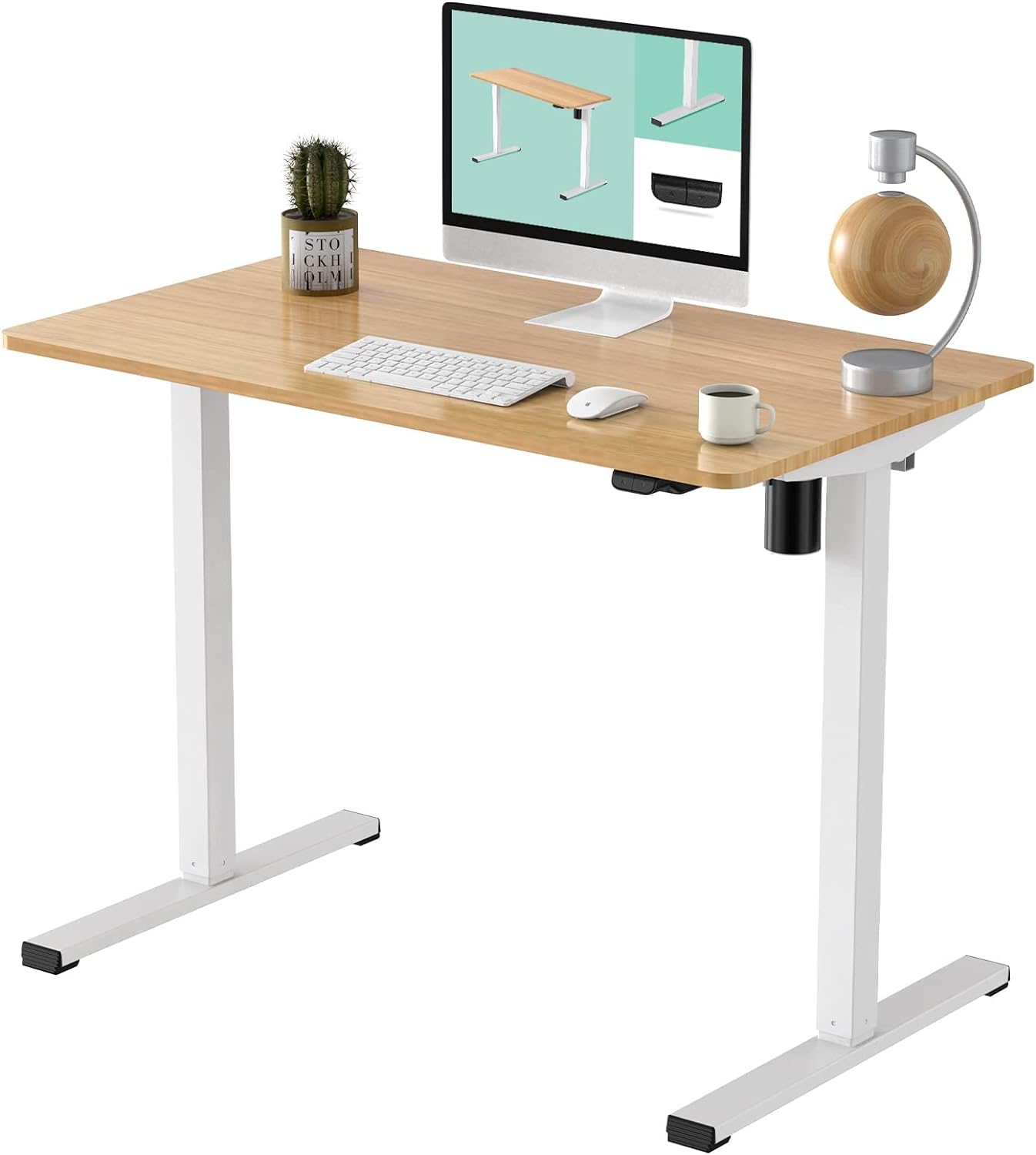
FLEXISPOT Adjustable Height Desk
This FLEXISPOT standing desk adjusts electronically from 28.6" to 46.3", at a speed of 0.6"/second. It has a 4.5-star rating on Amazon and more than 9,000 reviews.
- $159.99
- Amazon
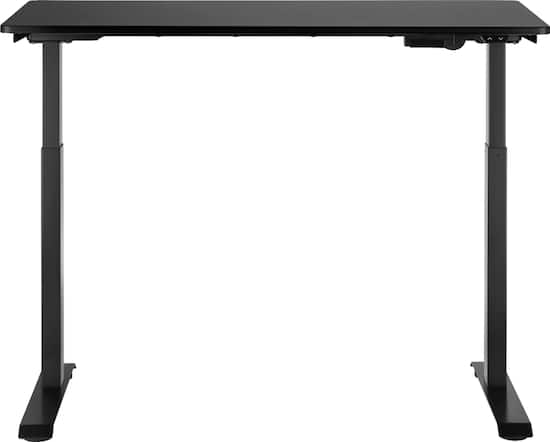
Insignia - Adjustable Standing Desk with Electronic Control - 47.2” - Black
This bestselling Insignia standing desk comes with two depth options. It can be used while sitting or standing and adjusts with an electric switch. This desk has 4.5 stars and more than 600 reviews.
- $299.99
- Best Buy
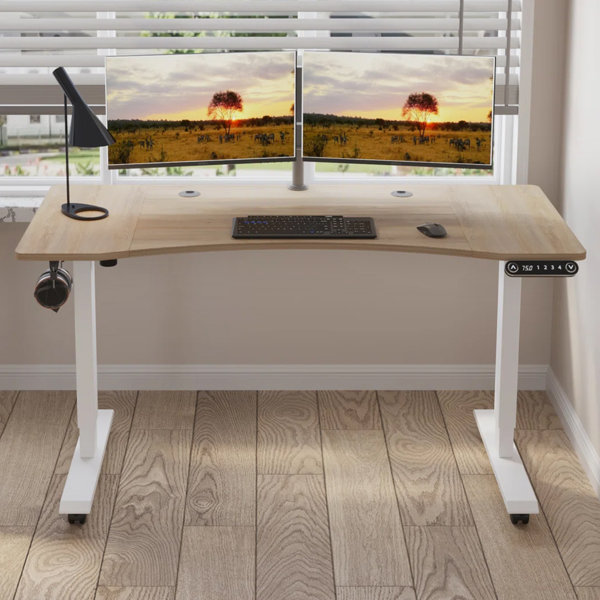
Daiah Ergonomic Curved Height Adjustable Standing Desk
This curved standing desk has an electric height adjustment and a memory height setting: It "owns 4-memorized buttons for customizing 4 different heights to meet your daily and office need," Wayfair's website explains. It also features an all-metal frame and can hold up to 180 pounds. More than 900 reviewers have given this desk a 4.5-star rating.
- $171.99
- $196.99
- Wayfair
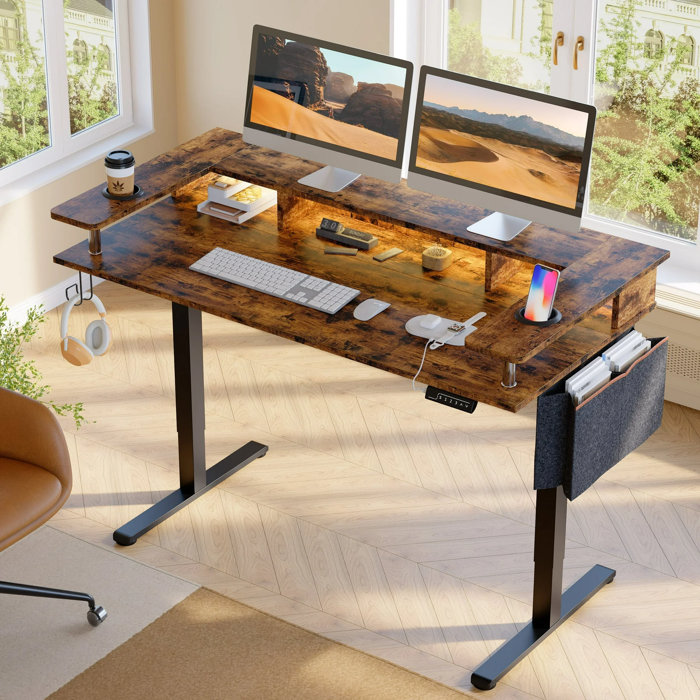
Labelle 58.1” W Height Adjustable Standing Desk, LED Gaming Desk With Monitor Stand
This adjustable standing desk features a monitor stand and three preset buttons to customize your desired height. There are also two cup holders, keyboard storage, headphone hooks and a storage bag.
- $273.99
- $324.99
- Wayfair
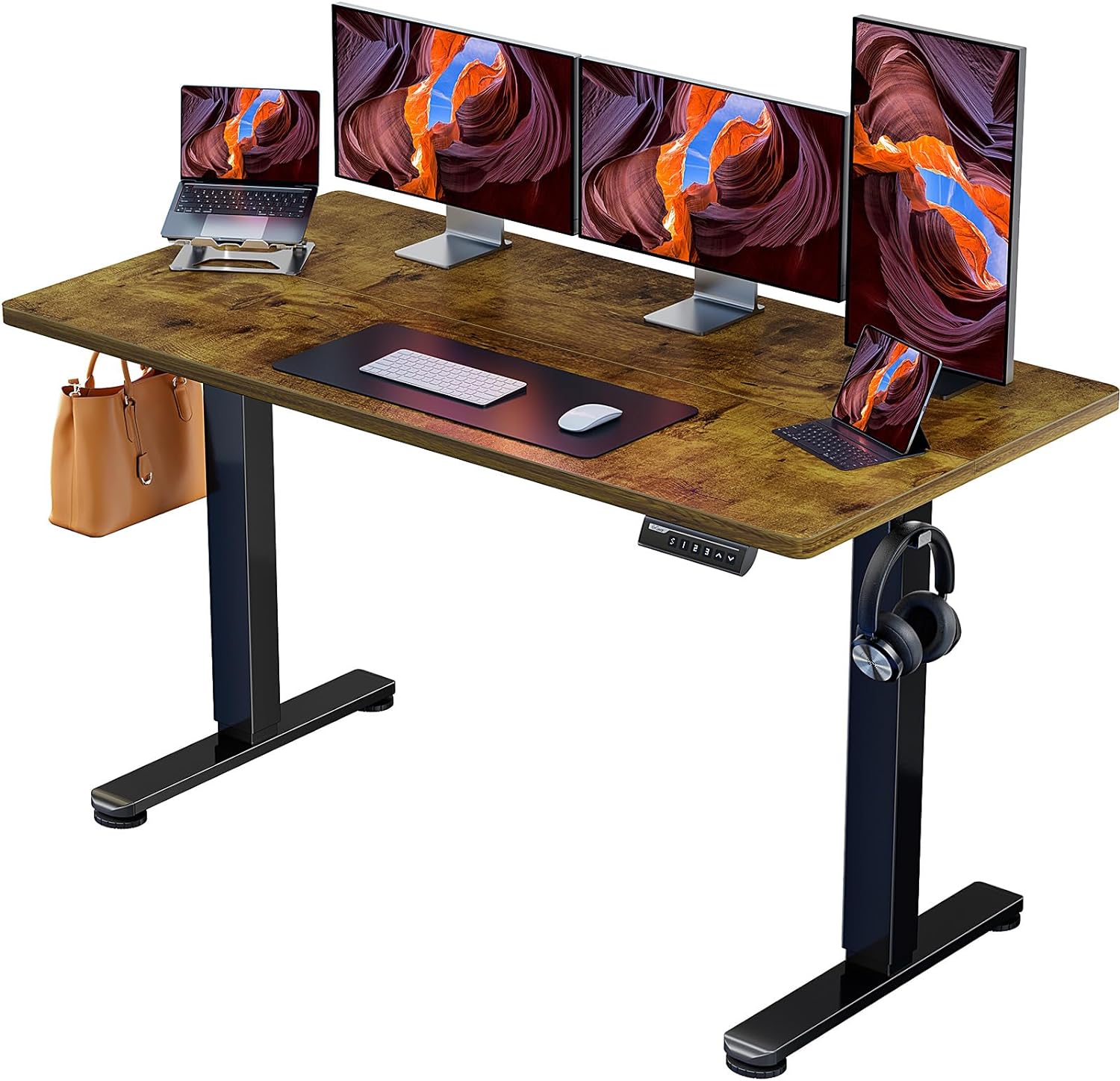
ErGear Height Adjustable Electric Standing Desk
This adjustable standing desk is available in multiple sizes so you can fit more than one work monitor.
- $229.99
- Amazon
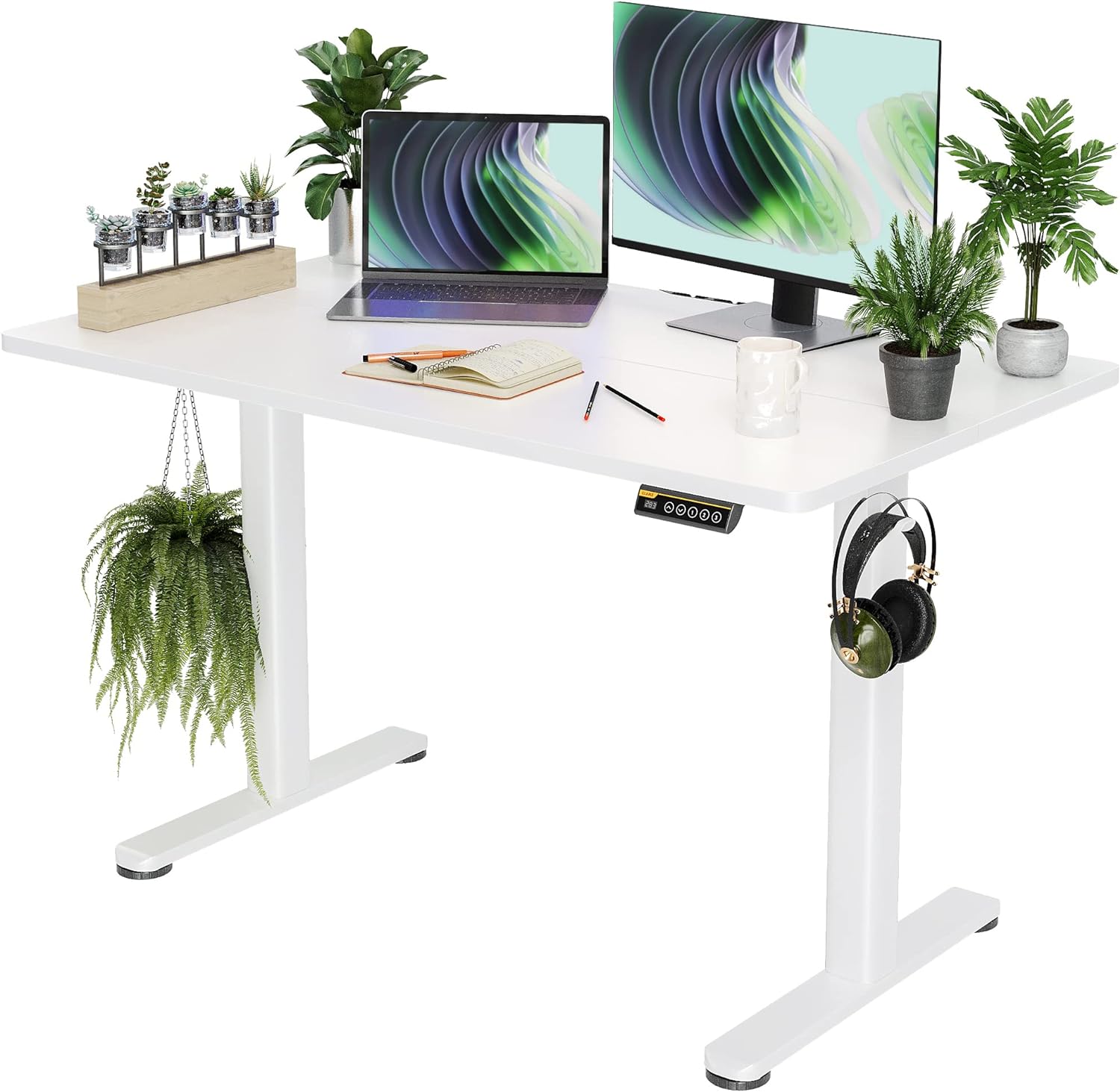
Claiks Electric Standing Desk
This Claiks standing desk boasts that it can hold up to 176 pounds and has three preset buttons to customize your desired heights. "The spacious 48” x 24” adjustable desktop offers a roomy setup that promotes an ergonomic workspace." Plus, it comes with a detailed installation manual, an accurate installation video guide and more to help you set it up at home.
- $159.99
- Amazon
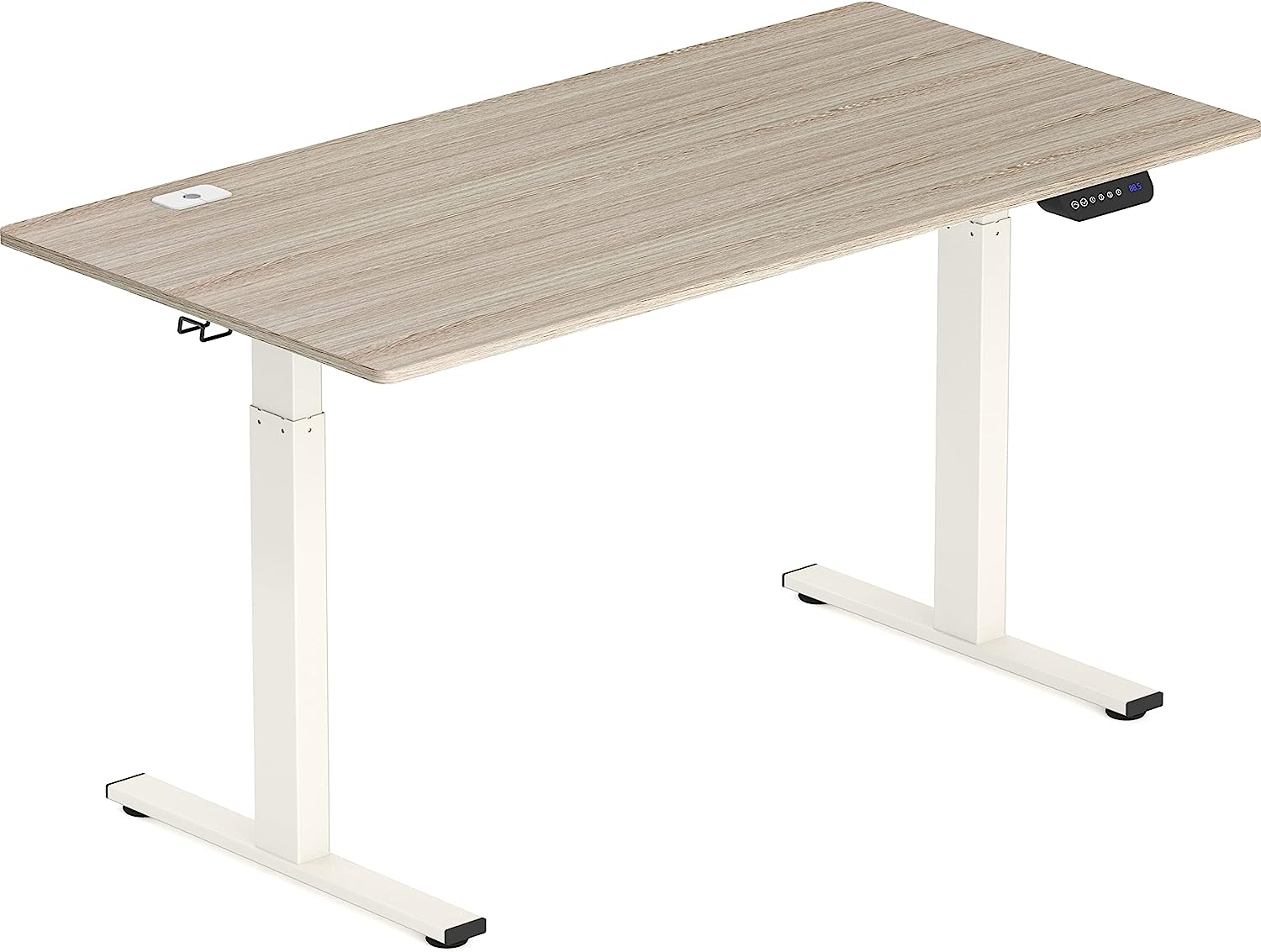
SHW 55-Inch Large Electric Height Adjustable Standing Desk, 55 x 28 Inches, Maple
Transition from sitting to standing with this highly-rated SHW standing desk, available in four different sizes and multiple colors. It has more than 19,000 ratings and 4.5 stars.
- $179.97
- $199.97
- Amazon

Juno Height-Adjustable Desk with Wireless Charging, Dry-Erase in Black Glass Top
This Juno height-adjustable desk has a 4.4-star rating on The Home Depot. It's height-adjustable and comes with a wireless charging pad and built-in charging ports. Plus, we like its sleek glass design top.
- $599.99
- The Home Depot